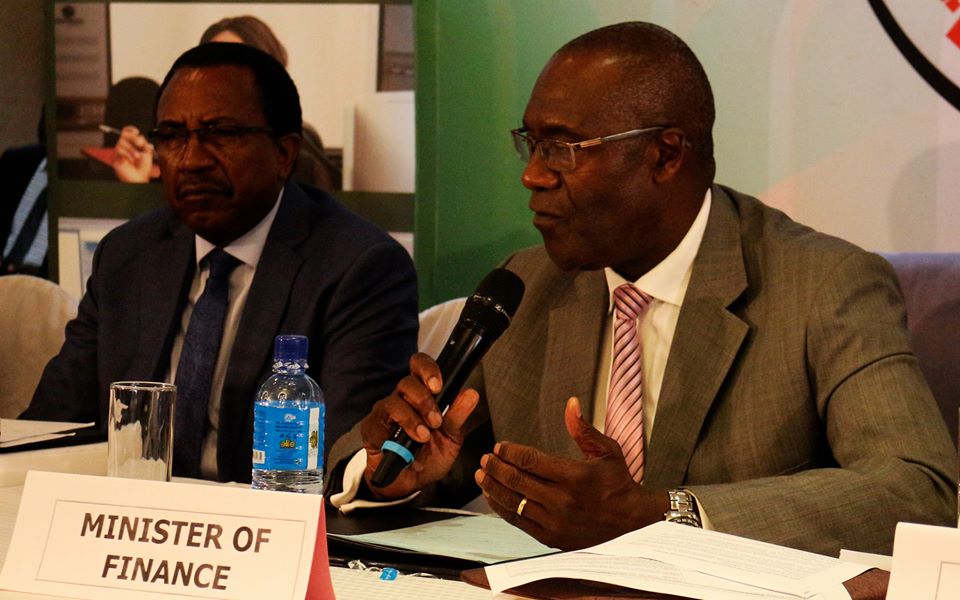Ministry of Finance (MoF) Zambia Budget Release Report for March 2020
Notice: Undefined index: catFilterList in /home/zambi/public_html/wp-content/plugins/wp-likes/api.php on line 243

Bwalya Ng’andu, MP
Zambia’s Ministry of Finance Budget Release Report for March 2020
By Favourite Jenala Kalando
IN MARCH 2020, the Zambian National Treasury K5.64 billion to finance various developmental and public service delivery programmes, says Ministry of Finance Spokesperson, Chileshe Kandeta.
Mr. Kandeta explains that of the K5.64 billion, K1.07 billion went towards both domestic and external debt service, while K2.2 billion was allocated to the public service wage bill, and K1.1 billion was released for transfers, subsidies and social benefits.
In a Ministry of Finance (MoF) Zambia Budget Release Report for March 2020, Kandeta says K819.2 million was on financing various government projects, programmes and general operations, and K437.6 million went to developmental programmes such as roads, rural electrification among others.
Consistent with our fiscal consolidation initiative – restated by the Minister of Finance Dr. Bwalya Ng’andu during the economic briefing to the nation delivered on Friday 27 March 2020 [see pages 3 and 4] – the Treasury released K500 million towards dismantling outstanding pension dues.
Further, Ministries, Provinces and Other Public Service Controlling Agencies received K89 million for liquidation of outstanding liabilities related to consumption of goods and services.
In the month under review, a sum of K104.7 million was also released for the purchase of drugs in Public Health Institutions and the fight against the Covid – 19.
Under general operations, the Treasury released K819.1 million, notable among which were the following expenditure areas; K7 million for purchase of drugs in Public Health Institutions and the fight against the Covid -19; K1 million for general operations of Ministries, Provinces and Other Public Service Controlling Agencies; K1 million for the Judiciary and the Ministry of Justice; K4 million for the Zambia Statistical Agency for 2020 Census preparatory programmes under the Ministry of National Development Planning; K6 million given to the Ministry of Higher Education for the skills development fund; and, K5 million given to the Examinations Council of Zambia for the administration of examinations programme.
According to Kandeta’s Ministry of Finance Zambia Budget Treasury Statement for March 2020,
Cooperating Partners released K193.3 million for donor supported programmes under various Ministries, Provinces and Other Public Service Controlling Agencies, while the Treasury released K609 million towards transfers (K549.4m) and subsidies (K59.6m).
An amount totaling K146.3 million went towards support for operations of eight (8) Grant Aided Institutional recipients, among others, were: Financial Intelligence Centre, K2.2 million; National Assembly (Constituency Offices), K5.5 million; Chiefs affairs, K5.2 million; Zambia Law Development Commission, K2.3 million; Zambia Public Procurement Authority, K3.6 million; Zambia Revenue Authority, K129.6 million; Local Government Equalisation Fund (LGEF), K98.9 million; and, Operations of Public Universities, K79.1 million.
To support scaling up of hospital operations countrywide, a total of K51.8 million was released in the month under review, with Non-tax revenue collection agencies receiving K43.6 million under the Appropriation-In-Aid (AIA) mechanism, bringing the first quarter support to this initiative to K144.4 million.
Appropriation-In-Aid is an initiative devised by the Ministry of Finance for non-tax revenue collecting agencies to retain a part of the funds raised through fines, fees, and levies etcetera.
With regard to the agriculture sector, Kandeta says the Government released K59.6 million of which the Food Reserve Agency received K28 million for grain purchases under the Strategic Food Reserve Programme while K21.6 million went towards the 2019/2020 Farmer Input Support Programme (FISP) and the Food Security Pack Programme received K10 million.
During the month under review, the National Treasury, supervised by Secretary to the Treasury Fredson Yamba, released K437.6million for capital development programmes, with the three (3) recipient programmes are the following; Road infrastructure, K407.6 million; Electricity infrastructure development in rural areas through the Rural Electrification Programme (REA), K22.5 million; and, Ministry of General Education infrastructure projects, K5 million.
Secretary to the Treasury Fredson Yamba in his weekly consultative meetings with players in the economy requested for optimal utilisation of work tools that the information and communication technology industry offers to ensure sustained productivity and the prudent utilisation of time at work.
In this regard, the Ministry of Finance confirms that measures have been instituted to enhance surveillance and evaluation of economic fundamentals aimed at assessing the impact of unfolding events in the international economy due to Covid-19 on the domestic economy, concluded a Ministry of Finance (MoF) Zambia Budget Release Report for March 2020, signed by MoF Spokesperson Chileshe Kandeta, who noted as referenced below in notes from the Media Statement delivered by Finance Minister, Dr. Bwalya Ng’andu, MP, on Friday 27th March 2020.

Chileshe Kandeta
NOTES FROM THE MEDIA STATEMENT DELIVERED BY FINANCE MINISTER, DR BWALYA NG’ANDU, MP, ON FRIDAY 27th MARCH 2020
The world has experienced an unprecedented outbreak of COVID-19. In Zambia, 39 confirmed have been recorded of which 2 have recovered and 1 has passed away. The impact of the outbreak has been both extensive and severe, including but not limited to, a health and economic crisis characterized by financial market stress and a collapse in commodity prices. The outbreak has led to disruptions in supply chains, created uncertainties and significantly dampened near-term growth prospects.
MEASURES TAKEN TO MITIGATE THE IMPACT OF COVID-19 ANNOUNCED BY THE MINISTER OF FINANCE ON FRIDAY 27th MARCH 2020
In response to the challenges that have been presented, we have implemented a number of first line measures which include:
Funding towards COVID-19 response
To finance the response towards COVID-19, Government has taken the following measures:
- i) Set up an Epidemic Preparedness Fund under the Ministry of Health amounting to K57 million;
- ii) Cabinet approved a COVID-19 Contingency and Response Plan with a budget of K659 million under the Disaster Management and Mitigation Unit; and,
- iii) The Government has started mobilizing funds through the budget and engagement with various local and international stakeholders.
Resources available from multilateral organisations
Zambia is in the process of making applications to multilateral partners for COVID-19 support. The International Monetary Fund is making available a total of US$50 billion to affected countries via rapid disbursement emergency facilities while the World Bank Group has approved support of up to US$14 billion for support to affected countries under a fast track COVID-19 facility.
Easing liquidity
To support the easing of liquidity in the wake of adverse COVID-19 effects, the Government will release a sum of K2.5 billion to:
- iv) Reduce domestic arrears owed to domestic suppliers of goods and services;
- v)
- vi) Reduce outstanding arrears to pensioners under Public Service Pension Fund and retirees under Ministry of Justice [K500 as indicated in the statement has already been released]; and,
- vii)
- viii) Reduce outstanding third-party arrears and other employee related commitments.
In addition, K140 million will be availed to pay local contractors in the road sector.
Tax relief
To provide relief to businesses in the wake of COVID-19, the Government will:
- i) Suspend excise duty on imported ethanol for use in alcohol-based sanitisers and other medicine related activities, subject to guidelines to be issued by ZRA;
- ii) Remove provisions of SI 90 relating to claim of VAT on imported spare parts, lubricants and stationery;
- iii) Suspend import duty on the importation of concentrates in the mining sector; and,
- iv) Suspend export duty on precious metals and crocodile skin.
Financial sector measures
[Further measures were issued by the Bank of Zambia on Friday 3rd April 2020]
The Government has taken a number of measures to encourage the use of digital financial platforms. These measures are aimed at preventing the spread of the disease by minimizing person to person contact in conducting financial transactions, decongesting banks and reducing the use of cash.
The measures are as follows:
- i) Waived charges for person to person electronic money transfers of up to K150. These transactions are now free of charge;
- ii) Revised upwards transactions and balance limits for individuals, small scale farmer and enterprises. The limits by agents have been revised upwards to give agents more float to deal with transactions. This is made to decongest banks;
- iii) Removed the transaction and balance limits on agents and corporate wallets; and,
- iv) Reduced the processing fees for Real Time Gross Settlement System.
Businesses and other organisations are encouraged to take advantage of these measures by adopting mobile money and other electronic forms to pay for goods and services to safeguard against or reduce the possibility of spreading the disease.
In addition, Government will issue a Statutory Instrument for Classification and Provisioning of Loans Directives to encourage financial service providers to provide relief to the private sector and facilitate long term lending to productive sectors of the economy. The Banking Sector is expected to pass on these benefits to their clients.
Business Continuity
With regard to the Single Treasury Account, the Integrated Financial Management Information System (IFMIS) and Payroll Management and Establishment Control (PMEC), the Government has put in place measures to enable continuity of its operations by making it possible for officers to work remotely.
In view of the anticipated difficulties in importing various consumer goods – the opportunity to work with major retail outlets in building domestic value chains that will encourage the sale of domestically produced goods in our major supermarkets, has arisen. The Minister of Commerce, Trade and Industry working with Ministry of Finance will engage major retail outlets to ensure that this process begins in earnest.
Conclusion
The announced measures are the initial response to the impact of COVID-19. Government may take additional measures to support the economy and respond specifically to the challenges the business community may face as well as safeguard the financial sector, should the situation worsen.
The Government will continue to review developments as they unfold and take appropriate measures where necessary. Most importantly, prevention is key. The appeal to all is that utmost personal hygiene and conduct as guided by His Excellency the President, the Ministry of Health and the World Health Organisation – must be observed unceasingly to avert devastating health, economic and financial consequences for Zambia.
REPUBLIC OF ZAMBIA Ministry of Finance www.mof.gov.zm

Secretary to the Treasury Fredson Yamba listens to Finance Minister Bwalya Ng’andu address Zambian on the Sate of the Economy on Wednesday 12th February 2020
REPUBLIC OF ZAMBIA
Ministry of Finance
BUDGET RELEASE REPORT FOR MARCH 2020
LUSAKA – In March 2020, the National Treasury released a sum of K5.64 billion to finance various developmental and public service delivery programmes.
Of this amount, K1.07 billion went towards both domestic and external debt service, K2.2 billion was allocated to the public service wage bill, K1.1 billion was released for transfers, subsidies and social benefits, K819.2 million on financing various government projects, programmes and general operations, and K437.6 million went to developmental programmes such as roads, rural electrification among others. The K1.07 billion released for both domestic and external debt service is in line with the government’s fiscal sustainability and debt reduction implementation strategy.
Consistent with our fiscal consolidation initiative – restated by the Minister of Finance Dr Bwalya Ng’andu during the economic briefing to the nation delivered on Friday 27 March 2020 [see pages 3 and 4] – the Treasury released K500 million towards dismantling outstanding pension dues. Further, Ministries, Provinces and Other Public Service Controlling Agencies received K89 million for liquidation of outstanding liabilities related to consumption of goods and services.
In the month under review, a sum of K104.7 million was also released for the purchase of drugs in Public Health Institutions and the fight against the Covid – 19.
Under general operations, the Treasury released K819.1 million, notable among which were the following expenditure areas:
- 7 million for purchase of drugs in Public Health Institutions and the fight against the Covid -19;
- 1 million for general operations of Ministries, Provinces and Other Public Service Controlling Agencies;
- 1 million for the Judiciary and the Ministry of Justice;
- 4 million for the Zambia Statistical Agency for 2020 Census preparatory programmes under the Ministry of National Development Planning;
- 6 million given to the Ministry of Higher Education for the skills development fund; and,
- K5 million given to the Examinations Council of Zambia for the administration of examinations programme.
Cooperating Partners released K193.3 million for donor supported programmes under various Ministries, Provinces and Other Public Service Controlling Agencies.
The Treasury further released K609 million towards transfers (K549.4m) and subsidies (K59.6m). Of this amount, K146.3 million went towards support for operations of Grant Aided Institutions.
Some of the recipients, among others, were:
- Financial Intelligence Centre, K2.2 million;
- National Assembly (Constituency Offices), K5.5 million;
- Chiefs affairs, K5.2 million;
- Zambia Law Development Commission, K2.3 million;
- Zambia Public Procurement Authority, K3.6 million;
- Zambia Revenue Authority, K129.6 million;
- Local Government Equalisation Fund (LGEF), K98.9 million; and,
- Operations of Public Universities, K79.1 million.
To support scaling up of hospital operations countrywide, a total of K51.8 million was released in the month under review.
Non-tax revenue collection agencies received K43.6 million under the Appropriation-In-Aid (AIA) mechanism, bringing the first quarter support to this initiative to K144.4 million. Appropriation-In-Aid is an initiative devised by the Ministry of Finance for non-tax revenue collecting agencies to retain a part of the funds raised through fines, fees, and levies etcetera.
With regard to the agriculture sector, the Government released K59.6 million of which the Food Reserve Agency received K28 million for grain purchases under the Strategic Food Reserve Programme while K21.6 million went towards the 2019/2020 Farmer Input Support Programme (FISP) and the Food Security Pack Programme received K10 million.
During the month under review, the National Treasury also released K437.6million for capital development programmes. Notable among the recipient programmes are the following:
- Road infrastructure, K407.6 million;
- Electricity infrastructure development in rural areas through the Rural Electrification Programme (REA), K22.5 million; and,
- Ministry of General Education infrastructure projects, K5 million.
Secretary to the Treasury Fredson Yamba in his weekly consultative meetings with players in the economy requested for optimal utilisation of work tools that the information and communication technology industry offers to ensure sustained productivity and the prudent utilisation of time at work. In this regard, the Ministry of Finance confirms that measures have been instituted to enhance surveillance and evaluation of economic fundamentals aimed at assessing the impact of unfolding events in the international economy due to Covid-19 on the domestic economy.

Chileshe Kandeta
Issued by:
Chileshe Kandeta
Spokesperson
MINISTRY OF FINANCE
NOTES FROM THE MEDIA STATEMENT DELIVERED BY FINANCE MINISTER, DR BWALYA NG’ANDU, MP, ON FRIDAY 27th MARCH 2020
The world has experienced an unprecedented outbreak of COVID-19. In Zambia, 39 confirmed have been recorded of which 2 have recovered and 1 has passed away. The impact of the outbreak has been both extensive and severe, including but not limited to, a health and economic crisis characterized by financial market stress and a collapse in commodity prices. The outbreak has led to disruptions in supply chains, created uncertainties and significantly dampened near-term growth prospects.
MEASURES TAKEN TO MITIGATE THE IMPACT OF COVID-19 ANNOUNCED BY THE MINISTER OF FINANCE ON FRIDAY 27th MARCH 2020
In response to the challenges that have been presented, we have implemented a number of first line measures which include:
Funding towards COVID-19 response
To finance the response towards COVID-19, Government has taken the following measures:
- i) Set up an Epidemic Preparedness Fund under the Ministry of Health amounting to K57 million;
- ii) Cabinet approved a COVID-19 Contingency and Response Plan with a budget of K659 million under the Disaster Management and Mitigation Unit; and,
- iii) The Government has started mobilizing funds through the budget and engagement with various local and international stakeholders.
Resources available from multilateral organisations
Zambia is in the process of making applications to multilateral partners for COVID-19 support. The International Monetary Fund is making available a total of US$50 billion to affected countries via rapid disbursement emergency facilities while the World Bank Group has approved support of up to US$14 billion for support to affected countries under a fast track COVID-19 facility.
Easing liquidity
To support the easing of liquidity in the wake of adverse COVID-19 effects, the Government will release a sum of K2.5 billion to:
- iv) Reduce domestic arrears owed to domestic suppliers of goods and services;
- v)
- vi) Reduce outstanding arrears to pensioners under Public Service Pension Fund and retirees under Ministry of Justice [K500 as indicated in the statement has already been released]; and,
- vii)
- viii) Reduce outstanding third-party arrears and other employee related commitments.
In addition, K140 million will be availed to pay local contractors in the road sector.
Tax relief
To provide relief to businesses in the wake of COVID-19, the Government will:
- i) Suspend excise duty on imported ethanol for use in alcohol-based sanitisers and other medicine related activities, subject to guidelines to be issued by ZRA;
- ii) Remove provisions of SI 90 relating to claim of VAT on imported spare parts, lubricants and stationery;
- iii) Suspend import duty on the importation of concentrates in the mining sector; and,
- iv) Suspend export duty on precious metals and crocodile skin.
Financial sector measures
[Further measures were issued by the Bank of Zambia on Friday 3rd April 2020]
The Government has taken a number of measures to encourage the use of digital financial platforms. These measures are aimed at preventing the spread of the disease by minimizing person to person contact in conducting financial transactions, decongesting banks and reducing the use of cash.
The measures are as follows:
- i) Waived charges for person to person electronic money transfers of up to K150. These transactions are now free of charge;
- ii) Revised upwards transactions and balance limits for individuals, small scale farmer and enterprises. The limits by agents have been revised upwards to give agents more float to deal with transactions. This is made to decongest banks;
- iii) Removed the transaction and balance limits on agents and corporate wallets; and,
- iv) Reduced the processing fees for Real Time Gross Settlement System.
Businesses and other organisations are encouraged to take advantage of these measures by adopting mobile money and other electronic forms to pay for goods and services to safeguard against or reduce the possibility of spreading the disease.
In addition, Government will issue a Statutory Instrument for Classification and Provisioning of Loans Directives to encourage financial service providers to provide relief to the private sector and facilitate long term lending to productive sectors of the economy. The Banking Sector is expected to pass on these benefits to their clients.
Business Continuity
With regard to the Single Treasury Account, the Integrated Financial Management Information System (IFMIS) and Payroll Management and Establishment Control (PMEC), the Government has put in place measures to enable continuity of its operations by making it possible for officers to work remotely.
In view of the anticipated difficulties in importing various consumer goods – the opportunity to work with major retail outlets in building domestic value chains that will encourage the sale of domestically produced goods in our major supermarkets, has arisen. The Minister of Commerce, Trade and Industry working with Ministry of Finance will engage major retail outlets to ensure that this process begins in earnest.
Conclusion
The announced measures are the initial response to the impact of COVID-19. Government may take additional measures to support the economy and respond specifically to the challenges the business community may face as well as safeguard the financial sector, should the situation worsen.
The Government will continue to review developments as they unfold and take appropriate measures where necessary. Most importantly, prevention is key. The appeal to all is that utmost personal hygiene and conduct as guided by His Excellency the President, the Ministry of Health and the World Health Organisation – must be observed unceasingly to avert devastating health, economic and financial consequences for Zambia.






















